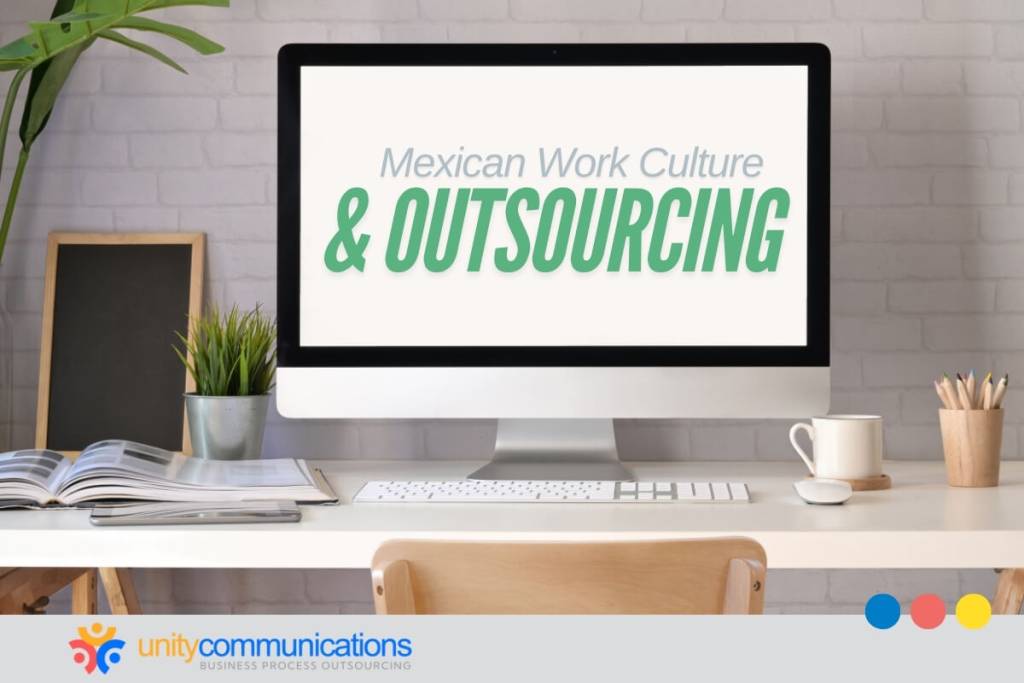IN THIS ARTICLE
Table of Contents
Mexico is a popular destination for business process outsourcing (BPO). The country offers advantages such as proximity to the United States, a skilled workforce, and competitive labor costs.
However, understanding the nuances of the country’s work culture is crucial. How your virtual assistants in Mexico view relationships, hierarchy, communication, and holidays can significantly affect your outsourcing initiative.
Are you considering BPO services in Mexico but are intimidated by potential work culture differences when you outsource? This article is for you. It explores critical aspects of Mexican office culture, their influence on outsourcing dynamics, and strategies for achieving cultural alignment.
Advantages of outsourcing to Mexico

You may be wondering, why outsource work to Mexico if cultural differences might hinder your success? Outsourcing to Mexico lets you access specialized talent and advanced technologies on a budget. The efficiencies and savings you gain from this practice make your business more profitable.
The benefits of outsourcing to Mexico outweigh the challenges associated with cultural differences, which is why it’s become a widespread strategy. In fact, Mexico’s BPO sector could reach $5.5 billion in 2024 and grow to $6.48 billion by 2029.
Here’s a quick breakdown of the different benefits of outsourcing to Mexico:
1. Access to specialized talent
Mexico boasts a rich talent pool with expertise in various industries, and outsourcing lets you tap into its potential. Additionally, Mexican universities and technical institutions are producing a steady stream of graduates with the skills needed to meet the demands of modern businesses.
Some tasks Mexican BPO teams can cover include the following:
- Customer service
- Information technology (IT)
- Technical support
- Sales and marketing
- Data entry and processing
- Human resources (HR)
- Accounting and finance
- General back-office operations
2. Increased leverage of advanced technology
Outsourcing companies in Mexico continue to invest in cutting-edge tools and infrastructure to provide clients with sophisticated solutions. According to Everest Group, the region is Latin America’s leading destination for technology service delivery.
Here are some of the standard technologies Mexican outsourcing companies use:
- Cloud computing
- Artificial intelligence (AI)
- Machine learning
- Robotic process automation (RPA)
- Data analytics
- Customer relationship management (CRM) software
- Quality assurance (QA) tools
3. Improved scalability and flexibility
BPO providers in Mexico can quickly respond to changing work volumes and customer transactions. Here are a few ways outsourcing lets you boost operational scalability and flexibility:
- Large talent pool: Maintaining an extensive talent network of pre-screened candidates allows BPO providers to quickly identify and hire agents to meet client demand. When you need more staff, BPO companies can use their database to match your criteria with active applicants and employees.
- Optimized shifting: Reliable service vendors implement the “follow the sun” model. This approach distributes agents to cover shifts throughout the day for round-the-clock coverage and uninterrupted service delivery.
- Leveraged technology: The tools and software BPO providers use can streamline operations. For instance, automation applications such as AI and RPA can simplify routine to-dos to help teams focus on more complex, high-impact work. They quickly adjust to accommodate increased workloads without requiring human resources.
This scalability and flexibility ensures you have adequate resources to meet changing market trends, customer demands, and business goals. It can specifically benefit organizations experiencing rapid growth or those in industries with seasonal fluctuations.
4. Significant cost savings
Mexico typically has lower salaries than the U.S. due to its lower cost of living. Companies can employ qualified outsourcing staff without breaking the bank. This is one factor that makes Mexico a good place to outsource.
For instance, the average monthly pay of a Mexican virtual assistant is around $4,000. Meanwhile, a virtual assistant in the U.S. earns $5,600 monthly.
Additionally, leveraging external tools lets you avoid costly technology investments and infrastructure purchases. Outsourcing also entails remote work, which means you can minimize expenses associated with having a physical office.
5. Focus on core competencies
With non-core processes managed by a well-equipped BPO team, your internal staff has more time and energy for matters directly influencing your business’s profitability. You can also reallocate the savings to these activities.
This empowers you and your team to innovate, improve product quality, and strengthen your organization’s competitive advantage. The increased focus on core competencies streamlines operations and boosts productivity.
Critical aspects of Mexican work culture and how to adopt them
The key to maximizing the many benefits of outsourcing is seamless collaboration. Understanding the nuances of Mexican work culture is the secret to achieving a productive outsourcing partnership.
Consider the following aspects of Mexican work culture when developing your outsourcing strategy.
1. Relationship-oriented: Building trust and personal connections
Family, community, and personal relationships are central to Mexican culture and continue to shape today’s society. In business, getting to know one another personally sets the foundation for harmonious professional relationships.
Here are a few ways you can build relationships with your Mexican BPO team:
- Social events (e.g., joining parties, going out for drinks, and participating in community events)
- Casual conversations (e.g., engaging in small talk about family, hobbies, travel, and other personal matters)
- Shared experiences (e.g., organizing team-building activities, company retreats, and joint employee training)
2. Hierarchical structure: Respecting authority and chain of command
Mexico’s history contributes to its hierarchical society. Spanish colonialism created a deep-rooted respect for authority and seniority.
Here are a few pointers to help you navigate the hierarchy in Mexican work culture when outsourcing to the region:
- Chain of command: Top-level management usually makes the decisions and cascades them to the bottom of the chain.
- Emphasis on seniority: Older, more experienced employees often receive more respect and authority.
- Consultative approach: It’s common for superiors to consult with subordinates or seek their input.
3. Family and community: Prioritizing personal commitments
Mexican culture is more collectivist than individualistic; people prioritize the group’s needs over their own.
Although this mindset fosters collaboration, it can also influence work-life balance, as family commitments and community involvement might take priority over work. Thus, you must be understanding and flexible with Mexican employees who might need to leave work early or take time off for family-related reasons.
4. Indirect communication: Understanding subtle nuances
Mexicans are often indirect about their opinions to avoid confrontation and preserve harmony at work. This culture must be considered when outsourcing, as it shapes communication and collaboration.
For instance, you might not get a direct no from Mexicans when they’re showing disagreement. Instead, you might hear more ambiguous answers, such as “maybe” or “perhaps.” Be attentive to nonverbal cues, such as:
- Facial expressions (e.g., smiling can mean approval, frowning can express confusion or concentration, and eye contact can be rude or aggressive)
- Body language (e.g., slouching or leaning back is disrespectful)
- Tone of voice and silence (e.g., the speed of a person’s speech can be a clue to their emotional state, and silence might indicate disapproval rather than agreement)
5. Face-saving: Avoiding public embarrassment
Due to the cultural emphasis on respect and harmony, Mexicans are susceptible to losing face or being publicly embarrassed. This is a severe social faux pas, damaging relationships and reputations.
Be mindful of others’ feelings and avoid situations that could embarrass them. A good practice is to avoid criticizing your Mexican BPO team in public. When giving negative feedback, do it privately and use positive and constructive language.
You can also use the sandwich technique. Start with a positive statement, share your negative feedback, and then end with another positive statement.
How Mexican Work Culture Affects Outsourcing Dynamics

Work culture differences influence productivity, collaboration, and efficiency. It also affects relationships between your internal team and outsourcing staff.
To better illustrate this, here are a few examples of how cultural differences can affect outsourcing dynamics:
Cultural alignment and communication
Cultural differences can often lead to misunderstandings and miscommunications. By understanding Mexican communication styles, decision-making processes, and values, you can avoid common pitfalls and clearly communicate expectations.
Here are some examples of how differences in work cultures can create misunderstandings:
- Communication styles: A Mexican team member might use indirect language to express disagreement. A more direct colleague from another culture could misinterpret this, leading to frustration and misunderstandings.
- Language barriers: A foreign manager might use jargon unfamiliar to the Mexican team, causing confusion and delays.
- Cultural faux pas: A foreign team member might make an offensive joke or comment to Mexican colleagues due to cultural differences in humor or sensitivities. This can damage relationships and create a hostile work environment.
Productivity and operational efficiency
Compatibility with your Mexican team’s work culture can affect the efficiency of your outsourcing operations. When BPO teams feel understood and respected, they are more likely to be motivated and engaged.
Some instances where staff productivity might be negatively affected are:
- Unintended disrespect: A foreign manager might unintentionally undermine the authority of a Mexican team lead, leading to resentment and decreased productivity.
- Decision-making delays: If you do not understand workplace hierarchy, you might make decisions without consulting the appropriate individuals, leading to delays and inefficiencies.
- Conflicting expectations: A foreign manager might expect Mexican employees to work long hours or prioritize work over family commitments. This can lead to dissatisfaction and decreased productivity.
- Embarrassment: Publicly criticizing or embarrassing a Mexican employee can lead to feelings of shame and loss of face, which can negatively affect their performance and motivation.
Employee satisfaction
Embracing Mexican work culture can significantly enhance the satisfaction of the outsourcing team. Employees who feel valued, respected, and understood are more likely to be loyal, motivated, and committed to their work.
Meanwhile, poor working conditions and experiences could lead to absenteeism and turnover, undermining your efforts for cost-effective business process outsourcing to Mexico.
Here are some circumstances you must avoid to maintain employee satisfaction:
- Lack of flexibility: If a company is not flexible enough to accommodate Mexican employees’ family and community commitments, it can lead to absenteeism and turnover.
- Cultural insensitivity: Taking your Mexican BPO team’s culture lightly can lead to embarrassment, decreased motivation, and turnover.
- Respect for authority: Understanding and respecting the hierarchical structure is essential for employee satisfaction and motivation.
Benefits of understanding and adjusting to Mexican work culture
Ensuring work culture compatibility with your Mexican BPO team strengthens relationships, promotes clear communication, increases productivity, and reduces turnover. It can lead to a more sustainable partnership that maximizes the benefits of outsourcing.
Explore in detail the benefits of understanding and adapting to Mexican work culture when outsourcing:
Improved work relationships
Understanding and respecting Mexican work culture can help build rapport and trust with your outsourcing team. It also lays the foundation for stronger relationships and a more productive workplace. Here’s how:
- Fostering empathy: Cultural sensitivity allows you to see the perspectives of your Mexican counterparts. This can help you understand their motivations, concerns, and expectations.
- Preventing misunderstandings: Understanding Mexican work culture helps avoid misunderstandings that can lead to conflict. For example, knowing the importance of indirectness allows you to interpret responses accurately.
- Resolving conflicts: Cultural sensitivity can help you resolve disputes more effectively if they arise. Understanding the cultural context allows you to approach problems with empathy and respect and find mutually beneficial solutions.
More effective team communication
Better work relationships encourage honesty and openness, leading to more effective communication. This rapport breaks down barriers and creates a more comfortable and welcoming environment for communication.
More importantly, understanding Mexican work culture allows you to adapt your communication strategies to be more respectful, effective, and appropriate.
Here are some examples of more effective communication during outsourcing:
- Knowing that Mexicans often use indirect communication can help you interpret responses accurately.
- Understanding nonverbal cues can prevent misinterpretations.
- Using straightforward language, avoiding jargon, and considering interpreters helps send your message more clearly.
- Understanding the hierarchical structure avoids unintentional disrespect and delivers the message to the right people.
- Using respectful language avoids offense and creates a positive work environment.
Boosted team productivity
A culturally sensitive outsourcing environment can create a more inclusive workplace where your Mexican BPO team feels welcome and respected. It can also help reduce the stress and anxiety employees experience, improving focus, productivity, and accuracy.
Such conditions can increase morale and enhance the outsourcing team’s collaboration, creativity, and productivity. In addition, a motivated and productive team is more likely to innovate and develop unique solutions to help your business grow.
Thus, understanding Mexican work culture enables you to significantly maximize the benefits of outsourcing. It boosts your productivity to meet market and customer demands, achieve business goals, and become more competitive.
Reduced employee turnover
Appreciating your Mexican team’s work culture can help them feel like they belong and are valued in your outsourcing initiative. Employees who feel their culture is respected are more likely to be satisfied with their jobs and less likely to leave.
For instance, organizing events celebrating Mexican holidays and traditions, such as Cinco de Mayo or Dia de los Muertos, helps keep your BPO team comfortable. When they feel safe, they are less likely to experience stress and anxiety, which could lead to burnout and job dissatisfaction.
It also keeps them engaged, which is crucial in retaining employees. According to a report by Gallup, companies with high employee engagement had higher retention rates. That is 43% for low-turnover organizations and 18% for high-turnover businesses.
How to achieve cultural alignment in your Mexico BPO partnership

Mexican work culture must be well-integrated into your outsourcing initiative to sustain a productive partnership.
Here are some more long-term strategies to help you maintain cultural alignment:
1. Engage in cultural training
Cultural training is crucial to achieving cultural alignment in outsourcing partnerships in Mexico. By training Mexican and U.S. employees, you can increase understanding and awareness of cultural differences.
Some topics to cover in training programs are:
- Mexican cultural norms and work values (e.g., learning communication styles and values)
- Stereotypes and biases (e.g., addressing the machismo stereotype)
- Cultural sensitivity (e.g., avoiding offensive comments and gestures)
- Language training (e.g., teaching basic Spanish and English)
- Common phrases and expressions (e.g., knowing greetings and function words)
- Cultural nuances (e.g., practicing politeness and indirectness)
2. Consider cross-cultural communication
Cross-cultural communication is effectively communicating with people from different cultural backgrounds. It involves understanding and appreciating cultural differences in communication styles, values, beliefs, and behaviors.
Aside from understanding cultural nuances and implementing inclusivity training, active listening improves cross-cultural communication. Encourage team members to be more attentive to what others say and avoid interrupting.
3. Be flexible and adaptable
Being open-minded and willing to adapt to Mexican work culture can help you overcome challenges in outsourcing. Here are a few other ways to maintain cultural flexibility and adaptability:
- Avoid assumptions and be open to new perspectives.
- Embrace differences and diversity.
- Stay informed about cultural trends and developments.
- Improve your language and communication skills.
- Seek feedback and be willing to learn.
The bottom line
Understanding and respecting Mexican work culture is essential for successful outsourcing partnerships in the region.
Building relationships, communicating effectively, and demonstrating cultural sensitivity create a positive and productive work environment. This is the key to maximizing the benefits of outsourcing to Mexico.
If you want to learn more about BPO services in Mexico, let’s connect!





